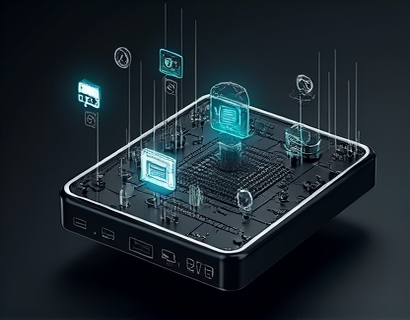AI-Driven Personalized Healthcare: Transforming Health Decision-Making
In the rapidly evolving landscape of healthcare, the integration of artificial intelligence (AI) is revolutionizing the way individuals access and utilize medical information. AI-driven personalized healthcare platforms are emerging as powerful tools, offering instant expert insights and reliable information tailored to individual needs. These platforms are designed to empower health enthusiasts and individuals in need, providing them with the means to make informed health decisions and enhance their overall well-being. This article delves into the transformative impact of AI in healthcare, focusing on how these advanced technologies are reshaping the future of personalized medicine.
The Rise of AI in Healthcare
The healthcare industry has long been recognized for its complexity and the critical need for personalized approaches. Traditional healthcare models often struggle to provide the level of customization required for optimal patient outcomes. AI technology addresses this gap by analyzing vast amounts of data to generate insights that are both precise and timely. The application of machine learning algorithms, natural language processing, and predictive analytics enables AI systems to understand individual health profiles and offer tailored recommendations.
One of the key advantages of AI in healthcare is its ability to process and interpret large datasets quickly. This capability allows for the identification of patterns and correlations that might be missed by human practitioners. For instance, AI can analyze a patient's medical history, genetic information, lifestyle factors, and real-time health data to provide a comprehensive view of their health status. This holistic approach is essential for developing personalized treatment plans that address the unique needs of each individual.
Instant Personalized Medical Insights
AI-driven platforms are designed to deliver instant personalized medical insights, bridging the gap between patients and expert knowledge. These platforms use advanced algorithms to sift through extensive medical databases, extracting relevant information that is directly applicable to the user's situation. Whether it's understanding symptoms, exploring treatment options, or managing chronic conditions, users receive timely and accurate guidance.
For health enthusiasts, this means having access to a wealth of information at their fingertips. No longer do they have to sift through unreliable sources or wait for appointments to get answers to their questions. AI platforms provide immediate access to expert-level insights, empowering users to take an active role in their health journey. This instant access to information not only enhances patient engagement but also promotes a proactive approach to health management.
Expert Advice at Your Fingertips
One of the most significant benefits of AI-driven personalized healthcare is the ability to receive expert advice without the need for in-person consultations. These platforms connect users with a network of medical professionals who can offer guidance based on the data provided. AI algorithms curate these interactions, ensuring that users receive advice from experts who specialize in their specific health concerns.
For individuals facing complex medical issues, having access to expert advice can be invaluable. AI platforms facilitate teleconsultations, where users can discuss their symptoms, medical history, and treatment options with specialists in real-time. This immediate access to expert opinions helps in making informed decisions and can lead to faster and more effective treatment outcomes. Moreover, AI can pre-screen symptoms and provide preliminary advice, reducing the burden on healthcare professionals and ensuring that critical cases are prioritized.
Reliable Information for Health Decision-Making
In an era where misinformation can spread rapidly, the reliability of health information is paramount. AI-driven personalized healthcare platforms are committed to providing accurate and evidence-based information. These platforms are built on robust databases that are continuously updated with the latest medical research and guidelines. AI algorithms ensure that the information presented to users is not only current but also relevant to their specific context.
Users can trust the insights provided by these platforms, as they are grounded in scientific research and clinical expertise. This reliability is crucial for individuals making health decisions, whether it's choosing a treatment option, understanding a diagnosis, or managing a chronic condition. By relying on AI-driven platforms, users can confidently navigate the complexities of healthcare, knowing that the information they receive is both accurate and trustworthy.
Enhancing Overall Well-Being
The impact of AI-driven personalized healthcare extends beyond immediate medical advice and insights. By providing users with a comprehensive understanding of their health, these platforms contribute to overall well-being. Users can monitor their health metrics, track progress, and receive personalized recommendations for lifestyle improvements. This holistic approach to health management fosters a sense of control and empowerment, encouraging individuals to adopt healthier habits and maintain a positive mindset.
For those managing chronic conditions, AI-driven platforms offer continuous support and monitoring. Real-time data analysis can alert users to potential health issues before they become critical, enabling timely interventions. Additionally, these platforms can integrate with wearable devices and other health tools, creating a seamless ecosystem for health tracking and management. This integration enhances the user experience, making it easier to maintain a consistent and effective health regimen.
Challenges and Considerations
While AI-driven personalized healthcare offers numerous benefits, it is essential to acknowledge the challenges and considerations involved. One of the primary concerns is data privacy and security. Ensuring that user data is protected and handled with the utmost care is paramount. AI platforms must adhere to strict data protection standards and comply with regulations such as the General Data Protection Regulation (GDPR) to build and maintain user trust.
Another challenge is the need for high-quality, standardized data. The effectiveness of AI algorithms depends on the quality and consistency of the data they process. Variability in data sources and formatting can impact the accuracy of insights generated. Therefore, continuous efforts are required to standardize data collection and ensure that AI systems are trained on reliable datasets.
Furthermore, the integration of AI in healthcare must be accompanied by a human touch. While AI can provide valuable insights and support, the nuances of human interaction and empathy remain crucial in healthcare. AI platforms should complement, not replace, the role of healthcare professionals. Collaboration between AI technology and human expertise ensures that users receive comprehensive and compassionate care.
The Future of Personalized Healthcare
The future of personalized healthcare is bright, with AI poised to play an increasingly central role. As technology advances, we can expect even more sophisticated AI systems that can predict health outcomes, personalize treatment plans with greater precision, and integrate seamlessly with various health devices and services. The potential for AI to improve patient outcomes, reduce healthcare costs, and enhance the overall quality of care is immense.
Healthcare professionals and technologists are collaborating to develop AI solutions that are not only effective but also user-friendly and accessible. The goal is to create a healthcare ecosystem where AI-driven personalized healthcare is the norm, empowering individuals to take charge of their health and well-being. By leveraging the power of AI, the healthcare industry can move towards a more patient-centered, efficient, and effective model of care.
In conclusion, AI-driven personalized healthcare represents a significant leap forward in how we approach health and wellness. By providing instant expert insights and reliable information, these platforms are transforming the way individuals make health decisions and manage their well-being. As the technology continues to evolve, the potential for positive impact on public health is vast, offering a promising future for all.










































